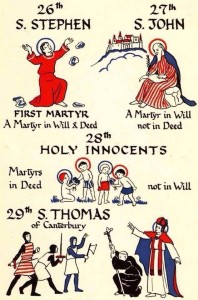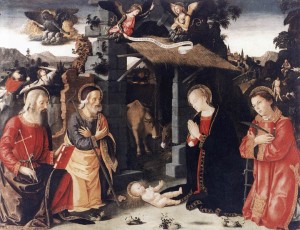Category: Advent & Christmastide
Rejoice, O mystical rod of Jesse
“Rejoice, O mystical rod which blossomed the unfading Flower.”
(excerpt from the Akathist Hymn to the Theotokos)
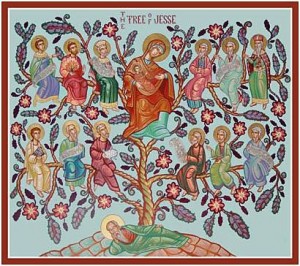 The genealogy of Jesus is very interesting and impressive for a variety of reasons. The Gospel of Saint Luke traces Jesus’ ancestry back from Joseph to Adam to show His connection to the inception of humanity; the Gospel of Saint Matthew begins his genealogy with Abraham –the Father of the Hebrew Nation– and moves forward, linking Him to the kingly line of David. Both strains of lineage demonstrate, therefore, that Jesus is the fulfillment of all Old Testament prophecies because He is a direct descendent of King David, the rightful heir to be the new “King of Israel.”
The genealogy of Jesus is very interesting and impressive for a variety of reasons. The Gospel of Saint Luke traces Jesus’ ancestry back from Joseph to Adam to show His connection to the inception of humanity; the Gospel of Saint Matthew begins his genealogy with Abraham –the Father of the Hebrew Nation– and moves forward, linking Him to the kingly line of David. Both strains of lineage demonstrate, therefore, that Jesus is the fulfillment of all Old Testament prophecies because He is a direct descendent of King David, the rightful heir to be the new “King of Israel.”
This, too, was prophesied by Isaiah who proclaimed that, “There shall come forth a shoot from the stump of Jesse, and a branch shall grow out of his roots. And the Spirit of the Lord shall rest upon Him” (Is. 11:1-2); Jesse is the father of King David.
God fulfills His promise. The icon presented here depicts mystical “root” often depicts the Virgin Mary in the center of a vine of the historic forefathers presents to the world the blossomed Fruit or Flower, Jesus, seated upon her throne-like lap.
Today, is a time to contemplate the Promise made Flesh in the birth of our Lord and Savior! For it is “Jesus who brought the fire of the Spirit, which takes away the desire for the things that are here, and removes us to another love” (Saint John Chrysostom).
Blessed Christmas
 Puer natus est nobis, et filius datus est nobis, cuius imperium super humerum eius, et vocabitur nomen eius magni consilii Angelus.
Puer natus est nobis, et filius datus est nobis, cuius imperium super humerum eius, et vocabitur nomen eius magni consilii Angelus.
A Child is born for us, and a son is given to us; his scepter of power rests upon his shoulder, and his name will be called Messenger of great counsel.
Here’s a thought from St. Augustine: “Let us all together then, perfectly united in mind and heart, celebrate today the birthday of the Lord…. In the one who for our sake sprang up from the earth, let us in turn take possession of heaven.”
Mutual prayers!
4th Sunday of Advent
 The Psalm for today’s Mass has us singing: “Lord, make us turn to you; let us see your face and we shall be saved” (80). See in this verse what is happening between Mary and Elizabeth. Think of the baby Jesus leaping for joy in the womb of Mary at meeting of his cousin John. Have you been able to help others to experience, i.e., to see and to hear the Good News of Jesus coming into history this week? Have we made a place for Christ in hearts today?
The Psalm for today’s Mass has us singing: “Lord, make us turn to you; let us see your face and we shall be saved” (80). See in this verse what is happening between Mary and Elizabeth. Think of the baby Jesus leaping for joy in the womb of Mary at meeting of his cousin John. Have you been able to help others to experience, i.e., to see and to hear the Good News of Jesus coming into history this week? Have we made a place for Christ in hearts today?
A prominent Cistercian Father guides our reflection –Blessed Guerric of Iggy taught:
“’Be ready to go out to meet the Lord, O Israel, for he is coming…’ Do, Lord, rise up to meet me as I run to meet you. Since I have not the strength to scale your summits unless you stretch out your hand to me whom your hands have made, rise to meet me, and see whether there is any sinful way in me. If you find any sinful way in me at all, take it from me. Grant me the grace to live by your law and lead me in the ways of eternity, that is, in Christ who is the way by which we journey and the eternity which is our journey’s end: and undefiled way and a blessed dwelling place.”
Advent 2015
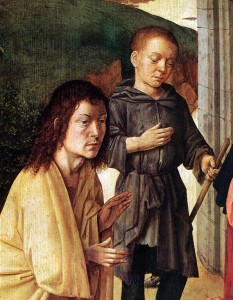 “How is it we are saved by you, O Lord, from whom salvation comes and whose blessing is upon your people, if it is not in receiving from you the gift of loving you and being loved by you? That, Lord, is why you willed that the Son of your right hand, the Man whom you made strong for your own self, should be called Jesus, that is, Savior, for he will save his people from their sins. There is no other in whom is salvation except him who taught us to love himself when he first loved us, even to death on the cross. By loving us and holding us so dear he stirred us up to love himself, who first had loved us to the end.”
“How is it we are saved by you, O Lord, from whom salvation comes and whose blessing is upon your people, if it is not in receiving from you the gift of loving you and being loved by you? That, Lord, is why you willed that the Son of your right hand, the Man whom you made strong for your own self, should be called Jesus, that is, Savior, for he will save his people from their sins. There is no other in whom is salvation except him who taught us to love himself when he first loved us, even to death on the cross. By loving us and holding us so dear he stirred us up to love himself, who first had loved us to the end.”
―William of Saint-Thierry
Baptism of the Lord
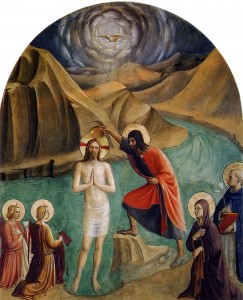 The Feast of the Baptism of the Lord causes us to reflect on the meaning of Baptism in our daily life: at home, at work, at school, in social situations, and the like. To truly live the fundamental meaning of Baptism is rather difficult, but we have grace.
The Feast of the Baptism of the Lord causes us to reflect on the meaning of Baptism in our daily life: at home, at work, at school, in social situations, and the like. To truly live the fundamental meaning of Baptism is rather difficult, but we have grace.
In the parish church the priest blesses water does the sprinkling rite to remind us of our Baptism.
Saint Proclus of Constantinople writes this about the meaning of Baptism of the Lord:
“Christ appeared to the world, and putting order into the disordered world he made it resplendent. He took upon himself the sin of the world and cast down the enemy of the world. He sanctified the founts of water, and enlightened the souls of human beings… Come, see the strange and new flood, greater and more excellent than that in the days of Noah. There the water of the flood destroyed the human race, but here the water of the baptism, by the power of him who is baptized in it, has called back the dead to life. There the dove carrying the olive branch in its beak denotes the fragrance of the sweet-smelling savor of the Lord Christ, but here the Holy Spirit coming in the form of a dove reveals to us our merciful God.”
In the words of the Acts of the Apostles in the second reading reading at the Novus Ordo Mass we hear, “In truth, I see that God shows no partiality.” God’s power and spirit belongs to all people who live according to God’s designs: the fear of God and acting uprightly (righteousness). This is what Jesus taught His Apostles. Do we follow the leader?
The baptized Catholic is a person whose heart belongs to the Lord in all things, no excuses, no trying to justify certain actions to ease the tension. To say we are Christian means that there is an obligation to follow the Leader and to lead the rest of the world into the kingdom of God promised to us. Do people know that we are Catholic Christians? Can people point at us and say, “There’s a Christian at work…at home…in the car…at the store…in the parking lot…in the dining room… with the parents…with the children?”
If you receive Holy Communion, and hence you enter in communion with the totality of Divine Revelation and the teaching of the Church, and you are in communion your brother and sister, then you can you are in communion with the Lord. At least that’s the hope. It is true, however, it is time to act uprightly so that God may be well pleased!
The Christmas season ends today. The beautiful decorations that give light and hope have run their course for now. The Christmas crib is a beautiful scene. It is the hope of Mother Church that the feast of the Baptism of the Lord would challenge us to live out the full meaning of Christmas more confidently. Otherwise, the cute little baby Jesus statues will be packed away with no impact in life. Hope this is not the case.
Epiphany Sunday
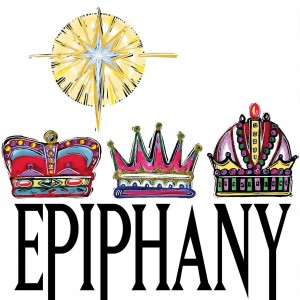 Today the Latin Church celebrates the Solemnity of the Epiphany, a move that slightly changes the idea of the 12 Days of Christmas; this move is less than optimal but I can see why it is done given that Catholics will not come to worship God on the actual day. The traditional day is that the Epiphany is observed on is January 6.
Today the Latin Church celebrates the Solemnity of the Epiphany, a move that slightly changes the idea of the 12 Days of Christmas; this move is less than optimal but I can see why it is done given that Catholics will not come to worship God on the actual day. The traditional day is that the Epiphany is observed on is January 6.
The feast of the Epiphany is an earlier feast than the celebration of Christmas. Theologically an epiphany is a manifestation, a revelation of God; Epiphany is also called Theophany. Think of Moses meeting God on the Mount in the experience of the burning bush.
Yet, the feast is not only about the recognition of the Wise Men –though important because the Magi demonstrate that we, from all nations, ought to adore the Lord– but in the feast we keenly see that Jesus’ mission is revealed and accepted. In the sacred Liturgy we pray at Vespers (in the Latin Church) the antiphons note that the Lord is baptized in the Jordan by his cousin, John, and that that his first miracle of changing water into wine; thus setting the trajectory of salvation history in motion. The spinning out of a Sunday celebrating the Lord’s baptism is a later fact.
A side note, the Eastern Churches maintain the Epiphany is a holy day –the Maronites have it as a day of obligation. The Epiphany is such significant feast that it must not be overlooked or casually winked-at. Several customs of the churches in the period of the Epiphany come to mind: blessing of incense and chalk, the blessing of water, the blessing of homes, the blessing of fruits (remember the Armenian blessing of pomegranates that I posted the other!).
Saint Leo the Great preached: “This is the day that Abraham saw and was glad. Knowing that in his offspring, that is, in Christ, the children of his faith would be blessed, and for seeing that his faith would make him the father of all nations, he gave glory to God in complete confidence he was able to do what he had promised.”
And Saint Basil the Great said this in a homily: “Stars cross the sky, wise men journey from pagan lands, earth receives its savior in a cave. Let there be no one without a gift to offer, no one without gratitude as we celebrate the salvation of the world, the birthday of the human race. Now it is no longer, Dust you are and to dust you shall return, but “You are joined to heaven and into heaven you shall be taken up.”
Both reflections by these saints ought to give us some important data: that God fulfills his promises and that we are given the gift of eternal life now (not only at death in a definitive way). The prayers of the Liturgy not spoken of here but hinted at pray that our hearts and minds be changed unto that what is of God. They speak of conversion, of truly accepting the fact of Jesus as Lord and Savior. Hence we can say that every Liturgy is an epiphany!
Saint Stephen
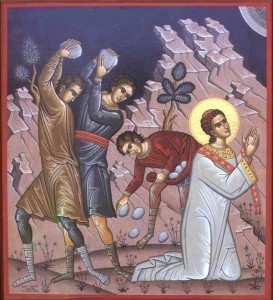 Saint Peter Damian thus begins his Sermon for this Feast: “We are holding in our arms the Son of the Virgin, and are honoring, with our caresses, this our Infant God. The holy Virgin has led us to the dear Crib. The most beautiful of the Daughters of men has brought us to the most beautiful among the Sons of men, [Ps. xliv. 3.] and the Blessed among women to Him that is Blessed above all. She tell us … that now the veils of prophecy are drawn aside, and the counsel of God is accomplished. … Is there anything capable of distracting us from this sweet Birth? On what else shall we fix our eyes? … Lo! whilst Jesus is permitting us thus to caress him; whilst he is overwhelming us with the greatness of these mysteries, and our hearts are riveted in admiration – there comes before us Stephen full of grace and fortitude, doing great wonders and signs among the people. [Acts, vi. 8.] Is it right, that we turn from our King, to look on Stephen, his soldier? No – unless the King himself bid us do so. This our King, who is Son of the King, rises … to assist at the glorious combat of his servant. … Let us go with him, and contemplate this standard-bearer of the Martyrs.”
Saint Peter Damian thus begins his Sermon for this Feast: “We are holding in our arms the Son of the Virgin, and are honoring, with our caresses, this our Infant God. The holy Virgin has led us to the dear Crib. The most beautiful of the Daughters of men has brought us to the most beautiful among the Sons of men, [Ps. xliv. 3.] and the Blessed among women to Him that is Blessed above all. She tell us … that now the veils of prophecy are drawn aside, and the counsel of God is accomplished. … Is there anything capable of distracting us from this sweet Birth? On what else shall we fix our eyes? … Lo! whilst Jesus is permitting us thus to caress him; whilst he is overwhelming us with the greatness of these mysteries, and our hearts are riveted in admiration – there comes before us Stephen full of grace and fortitude, doing great wonders and signs among the people. [Acts, vi. 8.] Is it right, that we turn from our King, to look on Stephen, his soldier? No – unless the King himself bid us do so. This our King, who is Son of the King, rises … to assist at the glorious combat of his servant. … Let us go with him, and contemplate this standard-bearer of the Martyrs.”
Quoted by Dom Prosper Gueranger
Love is the source
“Love, indeed, is the source of all good things; it is an impregnable defence, and the way that leads to heaven. He who walks in love can neither go astray nor be afraid: love guides him, protects him, and brings him to his journey’s end.
My brothers, Christ made love the stairway that would enable all Christians to climb to heaven. Hold fast to it, therefore, in all sincerity, give one another practical proof of it, and by your progress in it, make your ascent together.”
– St. Fulgentius
Peering into the Mystery of the Incarnation
The Lord your God is in your midst, a mighty Savior; He will rejoice over you with gladness, and renew you in his love. He will sing joyfully because of you, as one sings at festivals. (Zeph. 3: 14-18a)
I find myself at this time of year, with this feast, what does it mean that God has entered into my very circumstance. At leach of the Masses I genuflected at the part where the Incarnation was professed and wondered how at this moment there is a keen recognition of what the difference Jesus makes in world, among friends and enemies, indeed, all of life. A friend of mine said that Christmas reminds the baptized Christian that the Incarnation provides us the opportunity to know that God looks like us (but doesn’t act like us); God know the very circumstance of living. I spent so much time at the Christmas Masses wondering quietly —and aloud— about the fact of God’s gaze upon us through the Birth of His Son, Jesus. Asking myself, how is that God loves me so much that he peers into my existence in 2014? But, it is also how I peer into what God has so wonderfully done…
I think it is a true statement to say that Christmas is, more than any Christian celebration, a way to know that God is really in our midst. (Pascha has its own theological experience and data!) As my friend also said, “God’s involvement in our lives as the Word made Flesh, as Christ the Lord, as a real human being means that there is nothing in our lives that God cannot understand from personal experience.”
This sermon of the great Saint Augustine of Hippo helps me to consider anew what I profess to believe and to sharpen witness. Perhaps your meditation today and during the Octave will benefit from this sermon:
My mouth shall speak the praise of the Lord…by whom all things were made and who was made [flesh] amid all the works of His hands; who is the Manifestor of His Father, the Creator of His Mother; Son of God born of the Father without a mother, Son of Man born of a mother without a father; the great Day of the angels, small in the day of men; the Word as God existing before all time, the Word as flesh existing only for an allotted time; the Creator of the sun created under the light of the sun; ordering all ages from the bosom of His Father, from the womb of His Mother consecrating this day; remaining there, yet proceeding hither; Maker of heaven and earth brought forth on this earth overshadowed by the heavens; unspeakably wise, wisely speechless; filling the whole world, lying in a manger; guiding the stars, a nursling at the breast; though insignificant in the form of man, so great in the form of God that His greatness was not lessened by His insignificance nor was His smallness crushed by His might. When He assumed human form He did not abandon His divine operations… When clothed in the weakness of our flesh He was received, not imprisoned, in the Virgin’s womb so that without the Food of Wisdom being withdrawn from the angels we might taste how sweet is the Lord.
Why do we marvel at these conflicting powers of the Word of God when the discourse which I utter is apprehended so freely by the senses that the hearer receives it, yet does not confine it? If it were not received, it would give no instruction; if it were confined, it would not reach others. In spite of the fact that this discourse is divided into words and syllables…you all hear the whole discourse and each individual takes in the whole. While speaking, I do not fear that one listener may, by hearing me, grasp the whole discourse so that his neighbor can get nothing of it…Nor is this hearing accomplished at successive periods of time so that, after the dis- course which is being delivered has come to you first, it leaves you so that it may go to another person. No, it comes to all at the same time and the whole discourse is apprehended by each individual…How much more readily, then, would the Word of God, through whom all things were made and who, remaining in Himself, renews all things, who is neither confined by places nor restrained by time, neither changed by long or short intervals of time, neither adorned by speech nor terminated by silence, be able to make fertile the womb of His Mother when He assumed human flesh, yet not leave the bosom of His Father; to make His way hither for human eyes to gaze upon Him, and still to enlighten angelic minds; to come down to this earth while rul- ing the heavens; to become Man here while creating men there?
Let no one believe, then, that the Son of God was changed into the Son of Man; rather, let us believe that, with the perfect preservation of His divine nature and the perfect assumption of human nature, He, remaining the Son of God, became also the Son of Man. For the fact that the Scriptures say ‘The Word was God’ and ‘The Word was made flesh’ (Jn 1.1,14) does not mean that the Word became flesh in such a way as to cease to be God since, because the Word was made flesh, in that same flesh Emmanuel ‘God with us’ was born. …the word which we form within us becomes an utterance when we bring it forth from our mouth: the word is not changed into the utterance, but the voice by which it comes forth is taken on while the inner word remains un-changed; what is thought remains within, what is heard sounds forth. Nevertheless, the same thing is expressed in sound which had previously been expressed in silence…when the word becomes an utterance, it is not changed into this utterance, but remains in the light of the mind; having taken on the voice of the flesh, it reaches the listener without leaving the thinker…Both that which is considered in the mind, however, and that which sounds forth in speech are variable and diverse; the thought will not remain when you have forgotten it, nor will the utterance remain when you are silent. But the Word of the Lord remains forever and remains unchanged.
From Sermon 187: The Feast of the Nativity
